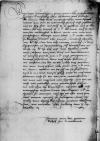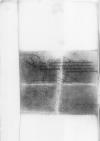Denn ersamenn unnd namhafftigenn herrn ⌊burgermeister unnd rathmann [der] koniglichenn stadt Danntzig⌋, / unsernn besonndern, gutten frunden.
Unnsernn freuntlichenn grues unnd alles guts zuvoran. Ersame, namhaftige herrn, besonndere, gutte freunde. /
Der herrnn rethe brief, unnderschriebenn unnd besiegelt, / wiewol inn dem der ordenntliche gbrauch nicht gehaldenn, / auch die thag zeitt / und stelle, do er gegebenn, / nach ist bliebenn, / hab wir dennoch uf Ewer Erbarkeit bitt, / damit auch in dem unnsere wilferigheit erkennt werde, / mit unnserm hantzeichenn bestetiget / unnd hiebey Ewer Erbarkeit widder lassen zukomenn. / Dieweil aber unnser sonnderlich schreiben / ann ⌊konigliche maiestet⌋ inn dem falh unnötig, / nemlich, so der her ⌊schatzmeister uf Mariennburg⌋ / sich kurtzlich, / wie wir bericht, / an koniglicher maiestet hoff nicht wirt begebenn, / wollet unns solchenn unnsernn brief / mit dem antwurt / uf unnsere gewerbe, / ann Ewer Erbarkeit negst getragenn, / widerumb zustellenn, / unns auch davor haltenn. / So wir wustenn, (: das Gott vorbitt :) solche drey personen, / wie vonn unns gehoret, solde seinn / inn Ewer Erbarkeit mittel sigenn, / woltenn wir dis, / sich vor sie zuhuttenn / unnd do es sonnst unnser pflicht unnd die noch wurd furdernn, / nicht hie vor unnsern unnderthanenn, / wie unns mit ungrund wirt zugelegt, / mit den wir nicht uber geburliche weise / gemeinschaft habenn, ane alle schew / bey kenntlichenn nhamen ei... nicht unanngezeigt lassenn, / dann dieselbtigenn Ewer Erbarkeit vor schadenn zw warnenn, / auch ihn vil ehre unnd guts, / sovil ummer muglich, / zu zufuegenn, / seinn wir willig unnd begirig. / Gottlichenn gnadenn befolhenn.

